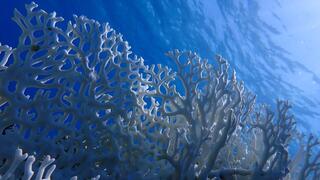
A significant coral bleaching event has been observed for the first time in the northern part of the Gulf of Eilat, and a study on coral bleaching, published Tuesday in Ecology and Environment, a journal focused on science and environmental policy, details the worrying findings. The comprehensive research was conducted by Dr. Asaf Zvuloni, an ecologist at the Eilat Bay Nature Reserve, alongside Dr.
Yonatan Shaked and Professor Maoz Fine from the Inter-University Institute for Marine Sciences in Eilat. Coral bleaching at the Gulf of Eilat ( Video: Dr. Asaf Zvuloni, Omer Amosi ) The researchers explain that the bleaching event was triggered by extreme changes in environmental conditions, primarily an unprecedented rise in sea water temperatures, highlighting the vulnerability of coral reefs to climate change.

When water temperatures exceed a critical threshold, the symbiotic relationship between corals and the tiny algae (zooxanthellae) living within them breaks down, causing the algae to be expelled. While corals can survive temporarily, they face a severe energy crisis (starvation), and prolonged exposure to high temperatures can lead to widespread coral mortality. 4 View gallery A coral that lost its colors ( Photo: Dr.
Asaf Zvuloni, Omer Amosi ) Numerous studies have shown that the corals in the Gulf of Eilat are known for their unique resilience to rising sea temperatures and the bleaching events associated with them. This resilience results from long-term selection in the southern Red Sea, particularly in the Bab al-Mandab Strait, which favors heat-resistant corals. The high temperatures in this area allow only the most heat-tolerant corals to enter the Red Sea from the Indian Ocean.
"The summer of 2024 was unprecedented, bringing extreme heat stress, with sea temperatures reaching a peak of 31.9°C and daily maximum temperatures above 30°C for two consecutive months in the Gulf of Eilat. Satellite data from the National Oceanic and Atmospheric Administration (NOAA) revealed that the accumulated heat stress experienced by the Eilat reefs during the summer of 2024 was 3.
75 times greater than the stress threshold that causes severe bleaching events in other reefs worldwide," Zvuloni explained. "While the resilience of the Eilat corals is globally unique, it appears they too have a tipping point, and it’s likely that the reef system reached a critical and worrying threshold this year." 4 View gallery ( Photo: Dr.
Asaf Zvuloni, Omer Amosi ) The inevitable response of the Eilat corals to these extreme temperatures was the first-ever bleaching of many coral species. Currently, the Israel Nature and Parks Authority is conducting surveys to assess the scale of the phenomenon and the recovery and mortality rates of the bleached corals. Dr.
Zvuloni emphasized, "There are also many local disturbance factors that could harm the natural resilience of the Eilat corals. For example, the combination of high temperatures and seawater pollution from nitrates has a critical impact on coral sensitivity to bleaching." Currently, nitrate levels from the Israeli coast into the northern Gulf of Eilat (such as brine from desalination processes and marine agriculture) exceed safe limits, and there are pressures to increase these discharges.
Given the observed rise in sea surface temperatures and the high, unpredictable frequency of heatwaves, any further increase in nitrate levels directly threatens the coral reefs, significantly raising the likelihood of severe bleaching events. 4 View gallery ( Photo: Dr. Asaf Zvuloni, Omer Amosi ) In many cases, when marine ecosystems are exposed to extreme conditions (such as heat stress and local disturbances) and are "pushed" to a critical point, the response can be abrupt and severe, as seen in many reef areas around the world, rather than a gradual decline.
In these instances, the ability to return to a previous state is often not possible, particularly in the face of changing climatic conditions beyond our immediate control, coupled with the growing pressure of disturbance factors over time. 4 View gallery ( Photo: Dr. Asaf Zvuloni, Omer Amosi ) So far, the coral bleaching observed in Eilat has not reached a severe level, but it is too early to determine its long-term effects.
Zvuloni concluded: "Given the unique resilience of the Eilat coral reefs, which makes them internationally significant, Israel has a responsibility to minimize local disturbance factors and maintain water quality in the Gulf of Eilat. Local conservation efforts can help preserve the natural resilience of Eilat’s corals not only as a national asset but also as an international treasure for current and future generations." Get the Ynetnews app on your smartphone: Google Play : https://bit.
ly/4eJ37pE Apple App Store : https://bit.ly/3ZL7iNv >.














